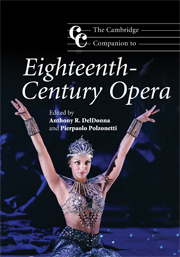Book contents
- Frontmatter
- Part I The making of opera
- 1 Opera as process
- 2 Aria as drama
- 3 Ensembles and finales
- 4 Metastasio: the dramaturgy of eighteenth-century heroic opera
- 5 Roles and acting
- 6 Ballet
- 7 Orchestra and voice in eighteenth-century Italian opera
- 8 To look again (at Don Giovanni)
- Part II National styles and genres
- Notes
- Bibliography
- Index
4 - Metastasio: the dramaturgy of eighteenth-century heroic opera
from Part I - The making of opera
Published online by Cambridge University Press: 28 September 2011
- Frontmatter
- Part I The making of opera
- 1 Opera as process
- 2 Aria as drama
- 3 Ensembles and finales
- 4 Metastasio: the dramaturgy of eighteenth-century heroic opera
- 5 Roles and acting
- 6 Ballet
- 7 Orchestra and voice in eighteenth-century Italian opera
- 8 To look again (at Don Giovanni)
- Part II National styles and genres
- Notes
- Bibliography
- Index
Summary
It is impossible to understand eighteenth-century opera without considering the work and legacy of Pietro Metastasio (1698–1782). The history of melodrama would have been fundamentally different if this extraordinary poet had not realized the enormous potential of the genre and had not made it a sophisticated venue for the circulation of contemporary cultural ideas and themes throughout Europe. In the course of the eighteenth century, Metastasio's libretti were seen as an unequaled model of style, technique, dramatic tension, and psychological insight. They provided, moreover, philosophical inquiries coupled to a unique command of drama. Metastasio's libretti were set to music by innumerable composers, attracted by the prestige and the literary elegance of his verses, which were regarded as gifted with an innate lyricism. Georg Frideric Handel, Domenico Sarro, Leonardo Vinci, Nicholò Jommelli, Nicholò Piccinni, Johann Adolph Hasse, and, of course, Mozart (whose La clemenza di Tito is among the most powerful settings of Metastasian works testifying how they were still popular in the last decades of the century) are only a small number of the composers among the legions that set Metastasio's libretti. Indeed, in the whole eighteenth century, setting a libretto by Metastasio was the first and ultimate test of distinction and ability for musicians throughout Europe. Even in the nineteenth century his works continued to be valued by artists of the caliber of Beethoven and Schubert and, of course, Rossini, who even set multiple versions of the aria “Mi lagnerò tacendo.”
- Type
- Chapter
- Information
- The Cambridge Companion to Eighteenth-Century Opera , pp. 66 - 84Publisher: Cambridge University PressPrint publication year: 2009



